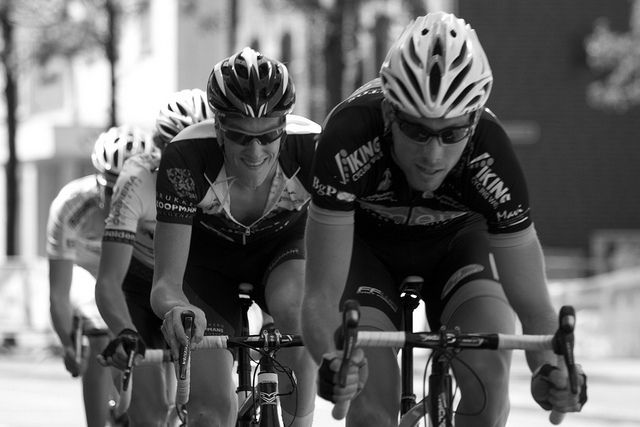Cooperation can help boost your reputation
A decision made without cost-benefit analysis still leads to personal benefits. ~ hehe who'd thunk it ? actually b'ing NICE to 1 'nother is actually ....good ! fuck~in A the more we invest~eee~gate,study ,research shit ( & piss away $$$ for "theses studies" ) the more we "find" out some of the "Old" ways ...work fucking a actuallllly helping 1 another is an wait , wait , Wait, Wait fer it a win win shit ~u~a~ tion ... un~fuckin~ be~liev~able & b'ing nice ,kind,smiling .... it's free fucking ...free ...but shit if ole mr. global finds out all that shit (nice,kind,smiling,help~in 1 t'nother) will goooooooooooooo black deeeeeeeeeeeeep black !!! guz the way he is run~in shit now .....welllllll shit's ruuuuuuuunin smoothhhhhhhhhhhhhhh yea smooth Oops geet out ta way motherfucker

Bicycle racers—even those on different teams—often cooperate to allow the entire group to go faster.
A recent study published in PNAS presents evidence that humans may engage in these types of uncalculating cooperative activities because it helps their reputation. By cooperating in the moment, people signal to others that they can be trusted to cooperate in the future.
The authors of the paper used a two-stage incentivized economic game to study this phenomenon. The first stage of the game asked participants to decide if they wanted to pay to benefit another player. Players could decide to help without looking at the cost, which was considered to be an uncalculating behavior, or they could check the cost before deciding to assist, which was interpreted as a calculating behavior. This calculating behavior was thought to be analogous to the type of cost-benefit analysis people often do before deciding to be cooperative.
The second stage of the experiment was a trust game in which players exchanged money with each other in phases. participants had to decide how much money to give to their partners without knowing the amount of money that the partner would later return to them, making the transaction risky. But each money exchange was tripled by the experimenter, so the payoff could be large. Still, it required a certain amount of trust that a partner would be generous in response to receiving generosity.
The researchers repeated this two-stage experiment twice. The first time, they looked at “calculating” behavior—whether or not a player looked at the amount of money required to benefit the other player in stage 1. The second time, the researchers examined the length of time it took participants to decide whether or not to help the other player in stage 1. Previous experiments have shown that quick cooperative choices are seen to be more sociable than decisions made after long deliberation.
In both experiments, participants were more likely to engage in uncalculated cooperative behavior if they knew that they were being observed, something that has been seen in other studies. Beyond that, however, the researchers found that participants who engaged in uncalculated cooperation were considered to be more trustworthy by their partners. This assessment turned out to be accurate: uncalculating cooperators actually were more likely to be trustworthy in subsequent trials of the game. So the early cooperation appears to be an honest signal of later behavior.
The authors say these findings support their hypothesis that people use uncalculating behavior to secure reputational benefits—they were signaling to their partners that they were trustworthy and reliable. These actions laid the groundwork for cooperation in the later stages of the game. According to the authors, this study is the first to show that people are more likely to show uncalculating cooperation when they know their reputations are at stake (like when they are being observed).
Even if people don’t make cooperative decisions based on a cost-benefit analysis, the choice to act cooperatively will be beneficial to their reputation and their future interactions. Ironically, even the most unselfish and uncalculated act of cooperation does in fact benefit the person who does it.
PNAS, 2016. DOI: 10.1073/pnas.1601280113 (About DOIs).
No comments:
Post a Comment